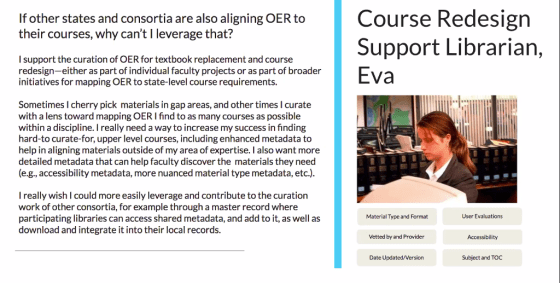|
Getting your Trinity Audio player ready...
|
OpenEd21 is happening this week and instead of tweeting I am blogging from selected sessions I am attending. These notes may be rough as the intent is to try to follow the flow of the talk and publish as soon as possible.
Session Description
Over the past year, ISKME has been working in collaboration with six academic library consortia (OhioLINK, LOUIS, VIVA, DigiTex, PALNI and PALCI) to study how faculty and library staff search for and discover OER. The research is part of a larger project funded by the Institute of Museum and Library Services to develop a solution that will enable postsecondary educators to more efficiently discover and share course-aligned OER across states, libraries, institutions, and repositories. This session will present the results of the first phase of this research, which included in-depth interviews conducted in early 2021 with 35 faculty and library staff spanning the participating consortia and seven states. (full abstract)
Presenters: Sophie Rondeau (VIVA), Michelle Brennan (OER Commons), Emily Frank (LOUIS), Cynthia Jimes (ISKME)
Session Notes
Cynthia set up context. This is the first phase of research looking into how to enable “efficient discovery of relevant OER across states and consortia”

Louisiana has a very comprehensive mapping of all 2 and 4 year courses and how courses map across state institutions and then has discovered OER that maps to the courses.
Course research questions:
- What are tasks and decision making processes do faculty & library staff use when making OER evaluation dn selection decisions
- What metadata extensions are needed to accomodate their decision making?
- What pain-points do they encounter when curating OER?
Researchers conducted in-depth 90 min interviews with 35 faculty and library staff spanning 6 academic library consortia (OhioLINK, LOUIS, VIVA, DigiTex, PALNI and PALCI). Pre-screen included those who had experience curating OER’s.
The interviews resulted in the development of five OER curation “personas” that describe archetypical users representing the curation and metadata needs of core faculty and library staff OER curators:
- The Faculty Textbook Replacer (aka Kendra)
- Faculty A La Carte Curator (aka Kevin)
- Collections Maintenance Librarian (aka Jaques)
- Course Redesign Support Librarian (aka Eva)
- OER Reference Librarian (aka Mira)
Kendra (faculty textbook replacer)
Low frustration threshld

Kevin (ala care faculty)
High frustration threshold

Mira (OER Reference Librarian)
On the front Fline. Strong advocate for OER.

Jacques (Collections Librarian)

Eva (Course Redesign Support Librarian)

After they coded the research and developed these 5 personas, they built out user stories for each of the persona and identified each personas motivations, goals and painpoints

Then created a user journey (from Searching, Evaluating, Selecting and Sharing) and categorized the user stories in order to identify the commonalities the personas had in order to define the most basic common user needs that would inform their design decisions in order to begin the work.
There was a lot of talk of metadata (not surprising considering this is primarily a library-driven research project).
My Takeaways
This type of works mirrors some of the work that my BCcampus colleagues are doing right now in the redesign of our open collection (see my next session notes), and represents (to me at least) a real shift in how we in the open education community are starting to think about and solve the longstanding issues of findability, and beginning to incorporate the tools and methods of UI and UX design, including developing user personas and user stories in order to develop more useful findability tools. I am hoping the next year will bring about some better methods of surfacing OER for those who wish to utilize them.
However, findability is much more than making OER findable and discoverable via search and through better metadata standards. That is not to diminish the need for solid metadata as this really needs to be an important consideration in ANY work being done around the findability of OER. But there is human work involved as illustrated by the types of personas that were represented here. Librarians working with faculty to help them source resources. I am still of the belief that careful human curation is the perhaps best way to ensure findability. Not the most scalable.
And I think we need to look closer at systematic initiatives like the Louisiana course mapping project as a great effort to assist in surfacing OER that aligns with courses across institutions.